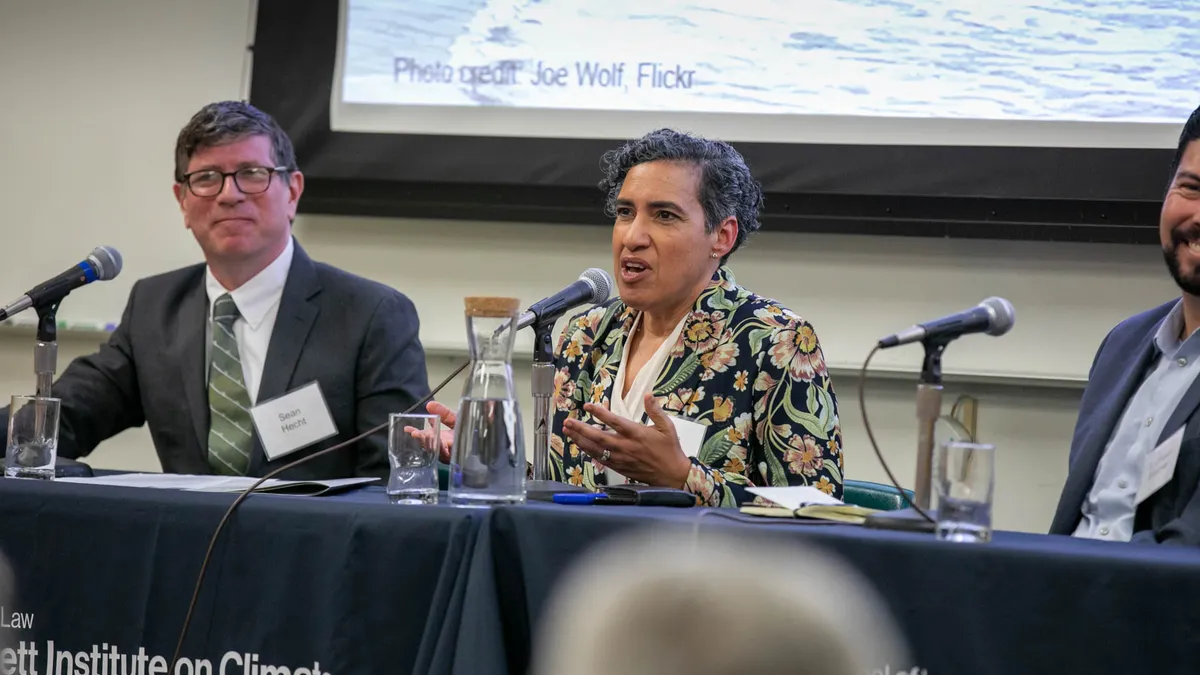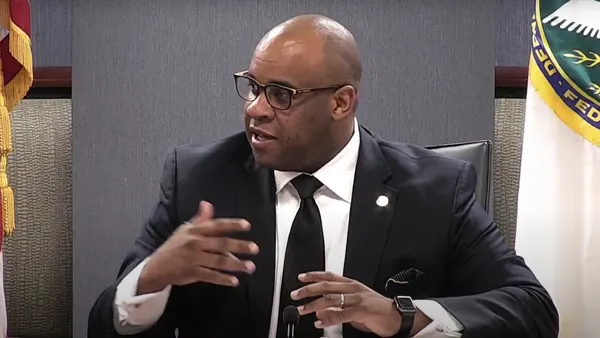Dive Brief:
-
California Public Utilities Commissioner Liane Randolph has been tapped as the next chair of the California Air Resources Board (CARB), Gov. Gavin Newsom announced this week.
-
Randolph, who oversaw the integrated resource planning process at the CPUC, will be poised to lead a number of important policies during her time at CARB, including crafting regulations around the state's recently-adopted goal of ensuring that all new passenger vehicles sold in California are zero-emission by 2035.
- Policymakers are growing increasingly aware of the nexus between energy planning and air pollution as well as climate goals, Adrian Martinez, staff attorney at Earthjustice, said. "So I think we're going to start seeing nationwide more folks from energy planning and the energy world engaged in the clean air world."
Dive Insight:
Randolph's appointment — which requires confirmation by the state Senate — was praised by several stakeholders, including Environmental Defense Fund President Fred Krupp. Randolph's "deep expertise and reputation of effective collaboration will be a huge asset in helping bring leaders across government, the private sector and the environmental community together to fight for clean air for all and a fully decarbonized California economy," he said in a statement.
She will be the first Black chair of the agency and her selection "adds much-needed diversity to the Board," David Pettit, a senior attorney at the Natural Resources Defense Council's climate and clean energy program, wrote in a blog post.
One of our CARB's key responsibilities is creating a framework to get to California's goal of achieving statewide carbon neutrality by 2045. The agency is in charge of creating and updating a scoping plan that covers how the Renewables Portfolio Standard program and other power sector initiatives feed into this statewide goal, Allison Smith, partner at Stoel Rives, said. While Randolph will not be directly regulating utilities, she'll be feeding policies from the CPUC into CARB's scoping plan and "figuring out how to put the puzzle together to get to carbon neutrality," according to Smith.
Randolph has been a commissioner at the CPUC since 2015, and led the commission's integrated resource planning proceeding, an umbrella planning process that weaves together electric procurement policies and programs with greenhouse gas reduction goals, while also ensuring a safe, reliable and cost-effective electric supply.
Randolph outlined some of the analysis from the first cycle of that process in a 2018 opinion piece in Utility Dive, noting the likely need for large amounts of renewables and battery storage by 2030, the retention of the existing natural gas fleet and reducing reliance on carbon-intensive out-of-state imports.
Her experience with the integrated resource planning process will likely be very useful at CARB, Smith said.
"She's going to be applying that same global perspective, but just expanding it," Smith explained.
That experience could prove to be even more of a benefit as California moves toward its zero-emission vehicles goals, which is likely to change electricity demand patterns. One analysis from Energy Innovation has indicated that staying on track to reach that goal would lead to a 9% increase in electricity demand by the end of the decade.
"Whether real of perceived, a lot of these reliability issues are being raised with adding more and more electric trucks and buses and other equipment onto the grid, and I think that experience — understanding deeply the energy system — will help," Martinez said.
In September, a group of Black employees at CARB wrote a letter raising concerns about systemic racism and implicit bias at the agency. The letter detailed some of the employees' experiences — related, among other things, to hiring practices and Black representation at the agency — and also listed a series of actions CARB could take to change its culture, including appointing Black people to its board and executive office.
"I hope Chair Randolph and the new board members, in addition to all the other board members, take on that issue and address the critiques, because they're very serious and important issues that need to be addressed at the agency," Martinez said.
One aspect of Randolph's time at CARB that will be different from previous Chair Mary Nichols' is the change of administration in Washington, D.C. In the past, the agency has had to spend time in partnership with the California attorney general's office in either defending itself or going on the offensive against the federal government, Smith said — "whether it's the federal government trying to knock out the cap-and-trade program linkage with Quebec, or challenging the Clean Air Act waiver for higher fuel emissions standards."
"It will make CARB's job easier to not have to worry about putting its resources to trying to combat what's going on at the federal level," she added.














